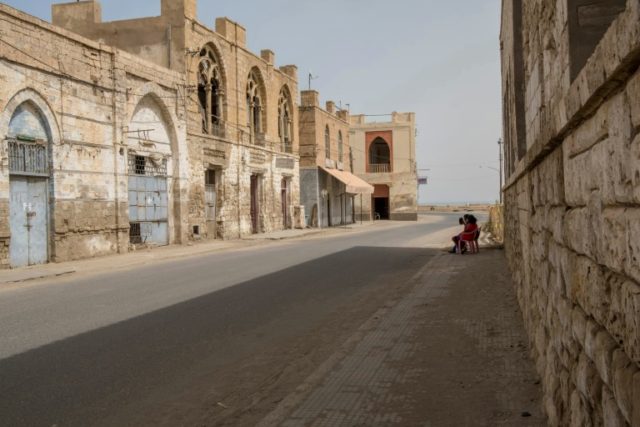Massawa (Eritrea) (AFP) – In the centuries-old Eritrean port of Massawa, the streets are so quiet that pedestrians’ footsteps can be heard echoing off the buildings in its crumbling old town.
Decades of conflict, sanctions and isolationist policies have seen trade shrivel up, with the harbour still lined with bombed-out buildings from Eritrea’s war of independence from Ethiopia, achieved in 1993.
But the cranes, berths and bars of Massawa are primed to bustle again after the Horn of Africa neighbours declared peace earlier this month, setting the stage for goods from landlocked Ethiopia to once again pass through this key port on the Red Sea.
As hotels eye renovations and new flights and trade routes are announced, Eritreans hope the newfound peace will breathe life back into the economy of one of the world’s most isolated nations.
“No people, no customers, no nothing,” said Yohannis Primo Gebremeskel, owner of the Grand Dahlak Hotel.
Despite being the fanciest accommodation in town, Yohannis said he gets few visitors and an entire 120-room wing of his hotel sits unused.
“It’s good that we are together (again),” he said, after an extraordinary peace process in a region suffering numerous intractable conflicts.
“For Ethiopia and also Eritrea, it is a big chance. I think Ethiopian people will come here every week.”
– Pearl of the Red Sea –
Once called the “Pearl of the Red Sea”, Massawa has changed hands between empires for centuries and is the site of what scholars believe to be Africa’s oldest mosque.
Its old city is filled with hotels and shops built when Massawa was part of the Ottoman Empire and then from the late 19th century until World War II when Italy was in control.
Decades after Eritrea was annexed by Ethiopia in 1962, the port became the site of a decisive battle in its struggle for independence.
At the gates of the city, three bomb-scarred tanks commemorate “Operation Fenkil” in 1991 when Eritrean rebels stormed the causeways connecting Massawa, an island, to the mainland.
Their victory paved the way for Eritrea’s independence vote in 1993.
In the aftermath, Massawa’s port continued to serve as a transshipment point for trade with Ethiopia, which lost its entire Red Sea coast when Eritrea seceded.
But business came to an end in 1998 when war broke out over the neighbours’ disputed land border.
The conflict lasted for two years and left 80,000 people dead.
The standoff continued after Ethiopia ignored a 2002 United Nations demarcation of their frontier and held territory belonging to Eritrea.
– No trade, little to sell –
Eritrea’s President Isaias Afwerki implemented hardline policies after the war that scared off investors and isolated his country.
These included jailing dissidents without trial, dismantling the independent press and pushing citizens into an indefinite national service programme that forces them into specific jobs and keeps them from travelling.
“Of course they wanted more economic development, but they prioritised national autonomy,” said Seth Kaplan, a professor at Johns Hopkins University in the United States who has studied Eritrea’s economy.
Things got worse after the UN Security Council imposed sanctions agains the country in 2009 for supporting Islamist militants in Somalia.
Eritrea on Monday announced the establishment of diplomatic ties with Somalia and Ethiopia has formally asked the UN to lift the sanctions.
The African Development Bank estimates Eritrea’s economy grew 3.4 percent in 2017, well below its neighbour’s eight percent.
Most of that growth came from the Bisha gold, copper and zinc mine.
Ore from the mine is exported via Massawa which does little else but import oil and consumer goods.
“Why would the port be functional when most parts of the world can’t trade with it, and they have very little to sell?” Kaplan asked.
Residents say that some months may see 10 ships arrive, and others, none.
– ‘Fast change’ –
Eritrean President Isaias this week hailed “a new, transitional phase” and end to an “epoch of crises, conflict and instability” in the Horn of Africa, but has said nothing about a change in his government’s own policies.
Residents are hopeful that peace between Ethiopia and Eritrea will bring trade and visitors back to the faded town.
Ethiopian Airlines has already restarted flights to the capital Asmara from two Ethiopian cities, and is planning services to Massawa and the southern port Assab soon.
“We now have hope,” said Mohamed Idris, a boat captain who ferries rare tourists from Massawa to islands in the Red Sea.
North of the city, visitors swim in the breakers at the Italian-built Gurgusum Beach Hotel, where fire-roasted goat is advertised on a menu ending in the exhortation “Victory to the masses”.
Despite the intense heat the hotel has no air conditioning, and manager Adam Ahmed says he is hoping the government pays for renovations.
“We’re waiting now for fast change,” he said.

COMMENTS
Please let us know if you're having issues with commenting.